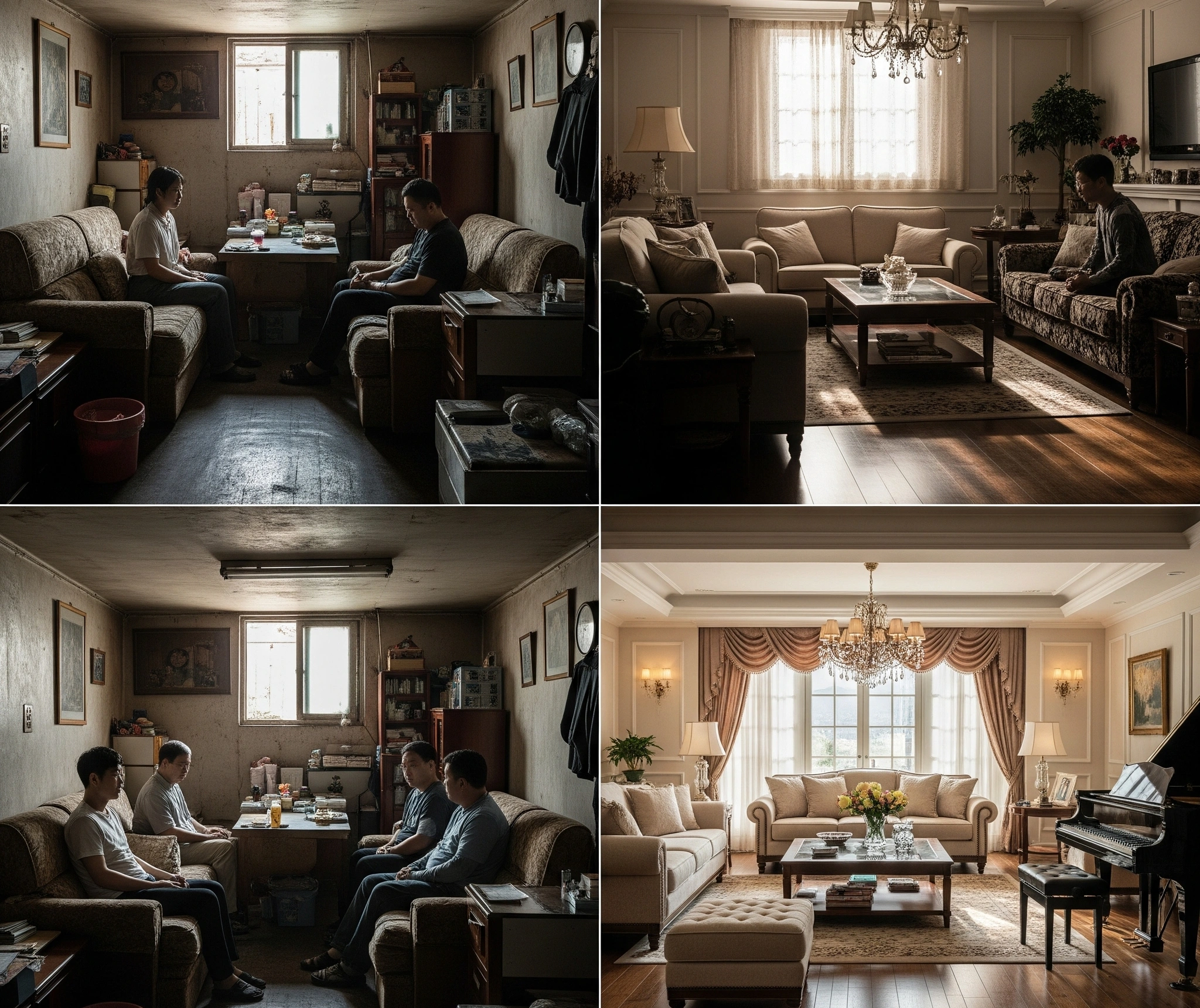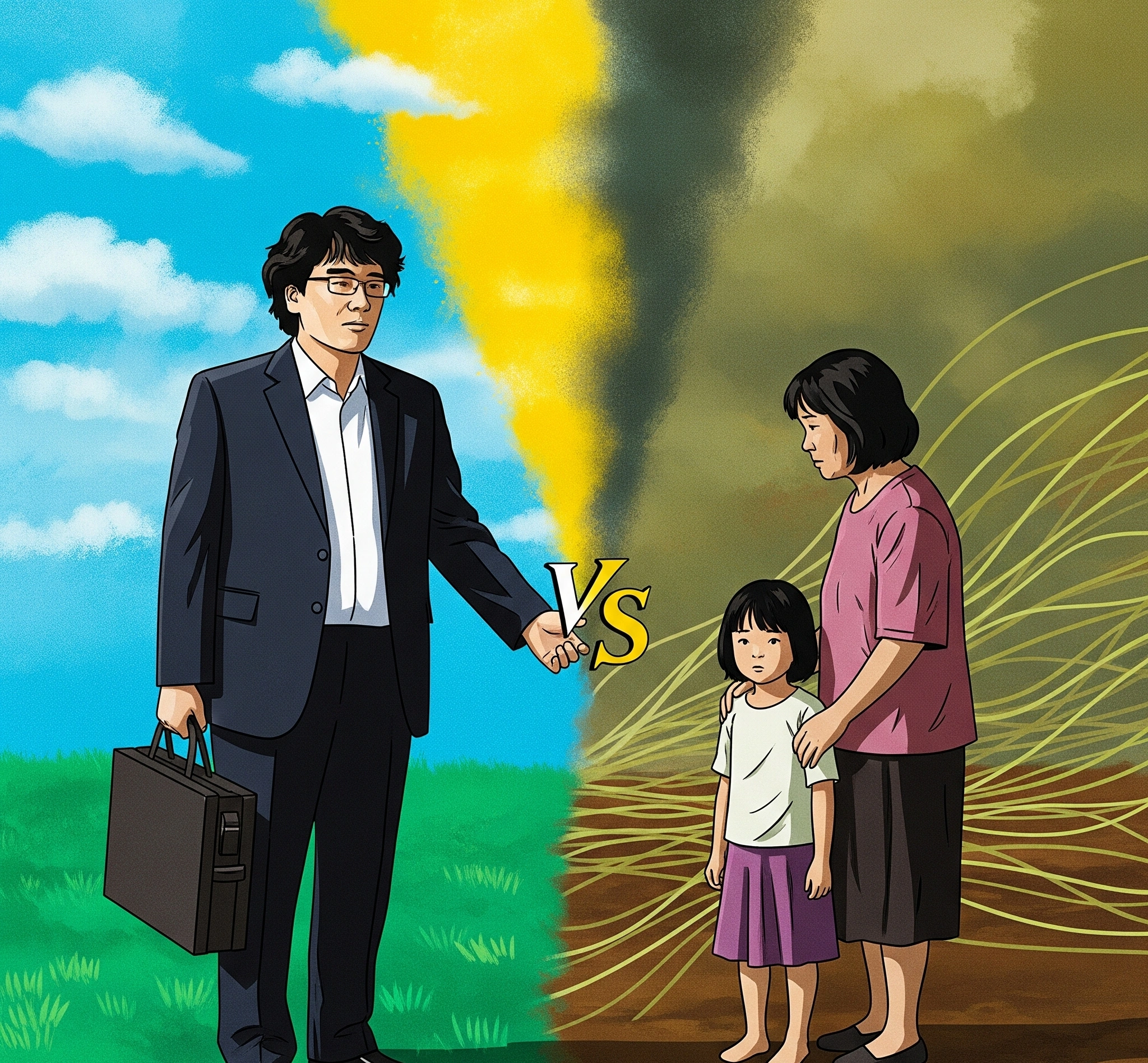Have you ever felt the invisible walls of society, the subtle yet pervasive barriers that define who we are and where we belong? In a world increasingly fragmented by economic disparity, the struggle for a foothold, for dignity, for mere survival, often plays out in silent battles. We often see success and failure as purely individual efforts, a sign of personal merit or lack thereof. But what if the very structures we inhabit, the homes we live in, and the people we interact with, simply reflect a harsh truth about our collective societal design? This article promises to reveal this misconception, showing how art, specifically Bong Joon-ho’s masterful film *Parasite*, acts not as a fantasy, but as a powerful psychological tool, a brutal social mirror reflecting the stark realities of class.
Table of Contents
- Unveiling the Social Mirror: A Sociological Lens on ‘Parasite’
- The Archetypes of Disparity: Unpacking Class Characteristics in ‘Parasite’
- The Flood and the Feast: ‘Parasite’s’ Brutal Class Commentary in Action
- Beyond the Screen: Actionable Insights from ‘Parasite’s’ Social Mirror
- Timeless Reflections: ‘Parasite’s’ Relevance in the Digital Age
- The Enduring Wisdom of the Unseen Reflection
A Sociological Lens on ‘Parasite’
What is a “social mirror” in the context of ‘Parasite’? This core concept, rooted in sociological theories like Charles Horton Cooley’s “looking-glass self,” suggests that our self-image and understanding of our place in society largely depend on how we believe others see us. In *Parasite*, this idea becomes even stronger, applying not just to individual identity, but to the shared identity of social classes. The film acts as a cinematic looking-glass. It reflects uncomfortable truths about economic differences, hidden biases of privilege, and desperate actions born from systemic disadvantage. This approach is not about blind faith or a magical reveal. Rather, it offers a deep sociological framework brought to life through a compelling story.
The “social mirror” idea began in early 20th-century sociology. It highlighted how our self-development connects to others. In *Parasite*, Bong Joon-ho expertly uses this principle for class dynamics. For instance, the Kims, living in their semi-basement apartment, constantly notice the Parks’ rich lifestyle. Their actions, consequently, stem from a desire to copy, enter, and ultimately survive within that mirrored image of success.
Conversely, the Parks live in their isolated world of wealth. They largely do not notice the Kims’ true nature, as their views are shaped by their own privileged perspective. The film, moreover, breaks down key parts of class interaction: the performed actions of social climbing, the subtle signs of status, and the clear physical and psychological gaps that money creates. It also offers a philosophical view of how economic standing affects not just material conditions, but also moral beliefs and human kindness. Ultimately, this is knowledge, not magic; it is a guide, not a prophecy. It reveals the complex dance between what we see, what is real, and our place in society.
Unpacking Class Characteristics in ‘Parasite’
The Kim Family: The Symbiotic Struggle
The Kim family represents the typical struggling lower class. They are known for being clever, adaptable, and possessing a strong desire to survive. Initially, they share a common struggle, with each family member contributing to their small income.
Their traits include sharp wit, a good eye for detail (especially regarding the Parks’ habits), and a strong family bond. While this bond offers them strength, it also traps them in their shared predicament. The duality here is profound: their cleverness serves as both their greatest asset and the very tool that leads to their sad end. Ultimately, they are survivors, but their survival often comes at the expense of others, highlighting the moral compromises forced by systemic pressure.
The Park Family: The Unknowing Privilege
The Park family shows the typical oblivious upper class. Their immense wealth defines their traits, granting them a comfortable life, an appreciation for beauty, and a deep separation from the struggles of those below them. They appear “nice” on the surface; however, this niceness stems directly from their privilege. They never truly face challenges or need to understand the harshness of poverty.
Their dualities involve their seeming innocence contrasted with their actual role in maintaining the class system. Their “niceness,” therefore, is a luxury, a byproduct of never having to truly understand or empathize with hardship. Consequently, their unawareness acts like a protective bubble, allowing them to stay “clean” while others live in metaphorical dirt.
Geun-sae and Moon-gwang: The Hidden Underbelly
Geun-sae and Moon-gwang represent the “hidden” or forgotten lower class. They exist beneath the surface, both literally and figuratively. Moon-gwang, the former housekeeper, shows loyalty and a desperate connection to her old job. Meanwhile, Geun-sae, her husband, symbolizes the completely marginalized, a ghost within the capitalist system.
Their traits include extreme vulnerability, long-suffering lives, and an eventual outburst of anger. Their duality is the sharp contrast between their invisible lives and their sudden, violent appearance. This, furthermore, highlights the explosive power of suppressed desperation. Their presence ultimately reveals the many layers of class, showing that even within the “lower class,” there are further levels of marginalization.
‘Parasite’s’ Brutal Class Commentary in Action
The climax of *Parasite* offers a powerful story, demonstrating how old ideas about class play out in a harsh, modern way. Consider the night of the heavy rain; it marks a key moment when the Kims’ risky plan falls apart. As the storm rages, their semi-basement home fills with sewage, vividly showing their social standing. They walk through the filth, holding their few belongings, forced to find shelter in a crowded gym with other flood victims. This, truly, is their reality: they are literally and figuratively at the bottom.
Meanwhile, the Park family, completely unaware of the destruction below, enjoys a grand outdoor garden party. They celebrate their son’s birthday. For them, the rain is merely a small problem, simply a reason to move the party indoors. The flood does not touch them; their lives continue in perfect comfort.
The “Aha!” moment arrives for the audience, and perhaps for Ki-woo, the Kim son. He sees this sharp contrast: the same rain that ruins one family brings a pleasant evening breeze to another. Mr. Park subtly complains about a “smell,” specifically the “smell of the subway.” This is not just a personal quirk; instead, it serves as a symbol of class, a scent that marks the Kims as “different.” This moment, therefore, clearly shows the main contradiction: the physical and emotional gap between classes. One family’s tragedy becomes another’s small issue. The film does more than just show this difference; indeed, it makes us *feel* it. Ultimately, it forces us to face the uncomfortable truth that privilege often hides the suffering it causes.
Actionable Insights from ‘Parasite’s’ Social Mirror
Understanding the deep class commentary in *Parasite* is not just about appreciating a great film. It is about becoming more aware of the social structures that shape our lives. Real change needs clear actions and careful self-reflection.
Here are 2-3 practical ways to use the insights from *Parasite*:
1. Practice Critical Media Consumption:
- How to Apply: When you watch films, read news, or use social media, actively question how different economic groups are shown. Ask: Who do they show? How do they show them? What stories are highlighted or ignored? *Parasite* teaches us to look past the surface. We should question the “nice” appearances and the “smells” that show class differences. This practice helps you understand the subtle messages about class in popular culture and news. You can then see them as reflections, not absolute truths.
- Philosophical Meaning: This is a powerful self-practice. It is not a magical ritual to control outside forces. It helps you become media literate and form your own informed views. You learn that media often acts as a social mirror, showing and sometimes strengthening social biases.
2. Engage in Empathy Exercises and Perspective-Taking:
- How to Apply: Actively look for stories and experiences from people and groups different from your own. You could read various books, listen to podcasts, or talk respectfully with people from different backgrounds. Try to imagine yourself in their situation. Think about the system-wide challenges they might face. *Parasite* makes us face the desperation of the Kims and the unaware privilege of the Parks. By consciously practicing seeing things from others’ viewpoints, we can close the empathy gap that often exists between social levels.
- Philosophical Meaning: This practice helps you develop compassion and challenge your own biases. It is a way to appreciate diverse human experiences. You learn that true understanding comes from stepping outside your own immediate reality.
3. Recognize and Question Systemic Structures:
- How to Apply: Beyond individual actions, think about the larger system issues that lead to class inequality. Research topics like how wealth is shared, housing rules, access to education, and labor laws. How do these structures create the “basements” and “mansions” in society? *Parasite* clearly shows how the environment itself decides opportunities and struggles. By understanding these system forces, you can stop blaming individuals. Instead, you can work towards supporting fairer systems.
- Philosophical Meaning: This is about gaining knowledge to understand the bigger forces at work. It helps you see societal outcomes as more than just individual failures or successes. It is a practical way to understand how society works, not a fixed prediction.
 ‘Parasite’s’ Relevance in the Digital Age
‘Parasite’s’ Relevance in the Digital Age
The brutal social mirror that *Parasite* holds up is not just about Korean society. Its themes are global, making it very important today, in the digital age. Wealth is increasingly concentrated, and income gaps are growing. In this time, the film’s portrayal of class struggle directly relates to current challenges. Issues like unstable jobs, the gig economy, and rising living costs mirror the Kims’ desperate need for steady income and a life with dignity. The film shows the Parks living a sheltered life, separate from the realities of those who serve them. This reflects the growing gap between the very rich and the working class in many countries.
Furthermore, the digital age, with its carefully chosen online personas and echo chambers, can accidentally strengthen class divisions. It often creates new kinds of “smells” and “basements.” *Parasite*, consequently, helps us understand how these subtle clues, whether online or offline, keep social differences in place.
Understanding this brutal social mirror brings huge benefits. For example, it makes us think critically about economic rules, encourages empathy between different classes, and starts conversations about social movement and fairness. By seeing the system forces at play, we can move past blaming individuals. Instead, we can work towards a fairer and more understanding society. This, in turn, connects old wisdom about social observation with modern problems.
The Enduring Wisdom of the Unseen Reflection
*Parasite* strongly reminds us that society is a complex fabric. It weaves together privilege and struggle, what we see and what we don’t. Its brutal social mirror forces us to face uncomfortable truths about class, empathy, and being human. It clarifies that economic standing is not just about individual effort. It shows the deep impact of system structures and the subtle ways we judge others based on their social positions. The film helps us look deeper. It encourages us to question our own biases. It also helps us see the natural worth in every person, no matter their place in society.
“The greatest illusion of this world is the illusion of separation. We are all connected, and the suffering of one is the suffering of all.”
Call to Action
Understanding the dynamics of class and privilege is the first step towards a more empathetic world.
Context and References
- Read more about the universal principles of color theory in La La Land.
- External References:
- Cooley, Charles Horton. Human Nature and the Social Order. New York: Charles Scribner’s Sons, 1902. (For the “looking-glass self” concept).
- Bong Joon-ho (Director). Parasite. Barunson E&A, 2019. (The primary subject of analysis).
- Sociological studies on class inequality and social mobility (e.g., works by Pierre Bourdieu, Max Weber).
Disclaimer: This content is provided for educational and cultural understanding. Sociological and cinematic concepts are part of a rich tradition, offering guidance for self-reflection and personal growth, not deterministic prophecies or absolute judgments.
About the Author/Source: This wisdom is shared by CineSage — a symbolic figure representing timeless wisdom, simplicity, and compassion. These writings are meticulously crafted by the KamarFilm.com team, comprised of cultural researchers, academics, and spiritual practitioners dedicated to preserving and translating ancient wisdom into a relevant format for contemporary generations. We believe that ancestral heritage is not merely a relic, but a compass for life. Each article is written through a process of research, cross-generational discussion, and deep contemplation, to ensure accuracy and the profound nobility of its contained values. Learn more about our authors and philosophy.

